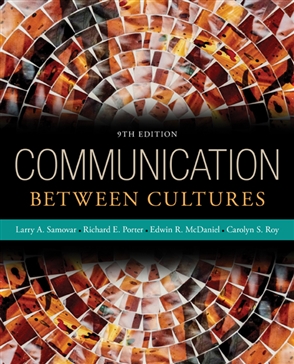Communication Between Cultures (2017)
Communication Between Cultures
By Samovar et al. (2017)
Book Review
 Humans are for nature interactive beings. This interaction
is supported by the process of communication in which individuals express their
ideas, opinions, feelings, and emotions. If we were not able to communicate
with each other, interaction will not be possible. One example that supports this fact is the biblical myth “The tower of Babel.” This myth narrates that God
could avoid humans from building the tallest tower ever, just by keeping them
from communicating. According to this story, since people could not communicate
with each other anymore, they could not continue the building. This story also suggests the origin of languages which are an essential part in communication.
Humans are for nature interactive beings. This interaction
is supported by the process of communication in which individuals express their
ideas, opinions, feelings, and emotions. If we were not able to communicate
with each other, interaction will not be possible. One example that supports this fact is the biblical myth “The tower of Babel.” This myth narrates that God
could avoid humans from building the tallest tower ever, just by keeping them
from communicating. According to this story, since people could not communicate
with each other anymore, they could not continue the building. This story also suggests the origin of languages which are an essential part in communication. Nowadays, human society is going through a globalization process that is connecting people from all over the world. This process allows people from distinct cultures to interact with each other. Consequently, a new necessity is emerging: How to communicate successfully through different languages with many distinct cultures?
 There is a book that exposes the importance of communication between cultures,
some of the processes and features involved in effective intercultural
communication, and some obstacles that may obscure this process. The book is
named “Communication
between cultures”
by Samovar et al (2017). This book is an excellent guide to understand as
well as improve intercultural communication.
There is a book that exposes the importance of communication between cultures,
some of the processes and features involved in effective intercultural
communication, and some obstacles that may obscure this process. The book is
named “Communication
between cultures”
by Samovar et al (2017). This book is an excellent guide to understand as
well as improve intercultural communication.
One theme
developed in this book is the cultural diversity that exist in this immense world.
The author explains how beliefs and traditions change across cultures. Each culture
has its distinguishing features that makes it unique, and each culture perceives
the same world in a special way. This diversity is what makes human race so
complex. This variety can be the cause of social problems, but at the same time
is it what enriches human society. The authors are successful in raising awareness
about the value of cultural diversity while giving advice on how to benefit
from it. Moreover, the writers emphasize the significance of respecting
differences in order to improve human interaction.
 The book
also analyzes the complexity of the communication process between cultures, its
significance, and how it could be effective. Communication is possible thanks
to languages as I mentioned before. So, just imagine people from different cultures who speak different
languages and see the world in opposite views trying to interact with each other. This may be hard if not
impossible. This impossibility of cultures to effectively transmits their messages
to other cultures has caused terrible consequences throughout history. This
book suggests what people need to consider for these events to be successful. It
shows that the first thing we need to do is to change our minds toward
differences. We need to expand the boundaries that exists in our minds. And this
could be achieved by reading books like this one. The authors explain the consequences
resulting when people are not open-minded toward others. Showing the
consequences of intolerance, they convince readers to start changing their behaviors
and perceptions of others.
The book
also analyzes the complexity of the communication process between cultures, its
significance, and how it could be effective. Communication is possible thanks
to languages as I mentioned before. So, just imagine people from different cultures who speak different
languages and see the world in opposite views trying to interact with each other. This may be hard if not
impossible. This impossibility of cultures to effectively transmits their messages
to other cultures has caused terrible consequences throughout history. This
book suggests what people need to consider for these events to be successful. It
shows that the first thing we need to do is to change our minds toward
differences. We need to expand the boundaries that exists in our minds. And this
could be achieved by reading books like this one. The authors explain the consequences
resulting when people are not open-minded toward others. Showing the
consequences of intolerance, they convince readers to start changing their behaviors
and perceptions of others.
This is an
incredibly useful piece of literature not only because it exposes a problem
that is affecting us as society but also because it helps raise awareness. Some
decades ago, the educational process about cultural diversity began across
countries, so we can say that almost all people have a basic knowledge of the
importance of respecting and valuing others´ differences. However, this educative
process should not stop any point in our lives. The authors of the book are
emphatic in the fact that we should keep learning about other cultures and try
to interact with the most people we can because this is the best way to eliminate
the barriers that separate us.
I really recommend reading this book but not only to
read it for yourself but to share with others what you learn from it.
Reference
Samovar,
L. A., Porter, R. E., McDaniel, E. R., & Roy, C. S. (2017). Communication
between cultures. Boston: Cengage Learning.
Very complete review! Thanks.
ResponderEliminar